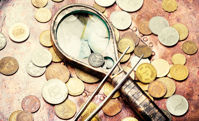Everyone has some old or rare coins rattling around. Whether you have some old pennies or foreign currency that’s been handed down from generation to generation or you’ve come across coins that you can’t make heads or tails of, old coins are a potentially precious commodity. However, your collection ” whether you’ve built it up intentionally or not ” doesn’t come with a clear dollar sign.
If you think some of your coins are valuable instead of just unusual, you need to sort through them and have them appraised. Here are four steps you can follow to go from owning coins to selling or insuring them.
Evaluate Your Coins Before Taking Them to a Professional Appraiser
You don’t want to take your entire collection into a dealer. They may charge an hourly or per-coin evaluation rate that sinks your profits. Also, taking in potentially rare objects without even a rough idea of their value puts you at risk of someone taking advantage of you. We recommend you start your journey by sorting through your coins.
Use a Guide to Sort Through Your Collection
Turn to a verified third-party resource, not the internet at large, to start sorting through your collection. If your collection only features domestic coins, we recommend the ‘Guide Book of United States Coins’ to start identifying unique finds. This guide can help you learn more about the sort of features, dates and rare images that make some coins more valuable than others.
As you go through your coins, start sorting them into two main groups: coins that are valuable enough to try and sell and coins that may not be worth the time and effort to sell. These two basic categories are an excellent place to start, though you can also categorize your coins by potential profit ranges or even make a spreadsheet that lists each coin with its name, features and presumed worth.
Determine Your Strategy
Once you know how valuable your coin collection might be, it’s time to decide what you want to do next. Do you want to sell your coins individually, or do you want to sell them as a collection? Collections have more value, but they are also more complicated ” you may choose to buy additional coins and create a more robust, high-value set to get top-tier pricing for a set of coins.
On the other hand, you may not want to sell them at all. If that’s the case, we recommend that you still have the coins authenticated and insured before you put them on display or in storage.
Pro Tip: As you’re sorting through your collection, don’t clean the coins [1]. A well-developed patina can make it hard to identify key features, but cleaning off that patina can ruin a coin’s value.
Have the Valuable Coins Authenticated
Now that you have a rough idea of your collection’s value, take it in for a professional opinion. Certified coin experts can authenticate your coins, verify your conclusions and give you more information about the coins’ value. It may be best to have all of your coins that are worth more than their stated dollar value formally appraised, just in case. Experienced coin dealers can also let you know if your coins are too damaged or even counterfeit.
What If Your Coins Are Counterfeit?
Counterfeit coins aren’t immediately valueless. While common or poorly made counterfeits generally aren’t worth much, some counterfeits are valuable or popular amongst coin collectors for their quality.
Additionally, if you have a high-value coin in your collection, it may be best to have it evaluated twice, just in case a convincing fake fooled the first expert.
What’s the Difference Between Coin Authentication and Coin Grading?
Coin authentication is the process of actually identifying what specific coin you have. The coin grading process, on the other hand, evaluates the physical state of the coin. Is it damaged or worn, or is it in mint condition? Many authenticators use the Sheldon Scale, which grades coins on a scale of 1 to 70 ” the higher your coin falls on the scale, the higher its value [2].
Find a Coin Dealer
Many times, your coin authenticator will also be a coin dealer. This can be incredibly convenient because they may offer you a price for your coins or your entire collection as soon as they finish the evaluation. However, potentially disreputable dealers may give you a lowball offer. Not only is this why it’s important to do your own research, but it also underscores the importance of finding a dealer you can trust. We recommend looking for dealers that are:
- Well-rated: If you research dealers in your area, you can find ones that previous collectors trusted. The reviews will clue you in to the dealer’s general trustworthiness and knowledge. If you live in an area with a lot of dealers, this is a quick way to sort through them.
- Experienced: It’s essential to find a dealer with experience in your coin’s geography or date range. They will know more about the coins and what to look for in potential counterfeits.
- Certified: Look for dealers who have been certified by trusted organizations in the industry, such as the American Numismatic Association. Dealers who have a high score through the Better Business Bureau are also more reputable and have fair business practices.
Once you’ve found a trustworthy dealer, you can set up an appointment to make a sale or even just get a second opinion.
Sell or Insure Your Valuable Coins
Knowing the value of your collection is important. A persuasive offer might even change your initial thoughts about selling or maintaining and growing your collection. However, once you know what you have, there are generally two recommended choices: sell or insure.
If you choose to keep your coins, having them appraised by a certified dealer can help you determine (and purchase) appropriate insurance coverage for the collection. In order to protect your collection’s value over time ” especially if you plan on adding to it ” make sure to have it reevaluated regularly.
No matter what course of action you take, it’s important to consider your collection as an asset, not just a coin collection. Its value can grow or shrink over time based on how you maintain it and add to it, and this can help you determine whether it’s worth saving or selling.
1. Vintage Cash Cow. ‘How To Clean Old Coins (Hint: Don’t!),’ https://www.vintagecashcow.co.uk/blog/tips-and-tricks/how-to-clean-old-coins-hint-dont/. Accessed September 10, 2020.
2. NGC. ‘NGC Coin Grading Scale,’ https://www.ngccoin.com/coin-grading/grading-scale/. Accessed September 14, 2020.










